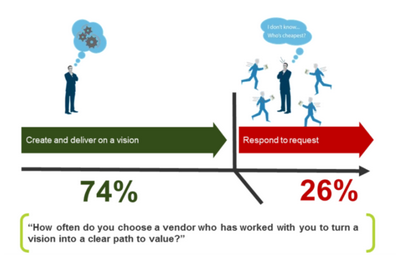
Ask Sales Questions & Tip These Odds in Your Favour
 How important is it to ask the right sales questions? Forrester Research published an astonishing stat which claims that the first seller to set a vision into a clear path to value has a 74% chance of winning the deal. That’s worth repeating…a 74% chance of winning the deal!
How important is it to ask the right sales questions? Forrester Research published an astonishing stat which claims that the first seller to set a vision into a clear path to value has a 74% chance of winning the deal. That’s worth repeating…a 74% chance of winning the deal!
This amazing statistic is getting a lot of buzz in sales blogs and numerous LinkedIn group discussions. And rightfully so.
What this means is that you have a three to one advantage over the competition when you can show your prospect how to obtain the value they seek. With those odds isn’t it worth digging deeper to understand exactly how to help your clients create and deliver on a vision?
What if I were to tell you that all you have to do is ask the right sales questions?
That’s why I wrote an article about the importance of leading with strategic questions rather than pitching
Why Ask Strategic Questions First Rather than Pitching?
First of all I am not a fan of the word ‘pitching’. It implies throwing something out and hoping it will strike a chord. ‘Positioning’ is my word of choice when it comes time to offer my ideas and solutions.
‘Positioning’ implies a strategic approach and one that is modified based on context. And the only way to understand the context is to ask questions FIRST.
So instead of pitching, isn’t it better to have a business conversation where you are asking high quality questions, deeply listening to the buyer and then responding not with answers but with deep, thoughtful follow-up questions? When you listen with the intention to hear rather than to tell, there is always the next logical question layered underneath your client’s response.
With this approach you will be able to tailor how you ‘position’ your solution in a way that resonates for your client. You can make linkages and tie back what you heard to create relevance and a vision of possibility.
Remember…setting a vision into a clear path to value gives you a 74% chance of winning the deal according to the Forrester research.
Without the right sales questions how can you understand what’s valuable for your buyer? Leading with strategic questions is your best shot at winning the deal.
The Quality of the Question Determines the Quality of Your Client’s Answer
“But I AM asking questions,” you say?
When I placed my article about Strategic Questioning in different LinkedIn groups people came out in droves defending that they ARE asking questions. That may be true, but the problem is they are not asking the right questions. Not all questions are equal. Not by a long shot.
And I will go further and claim that there is not enough listening going on. Asking a question and pouncing on the answer with your pitch is not called listening.
I am not referring to lame questions that only help the seller. Questions that pull out information, data and facts about the client should be researched well before the meeting ever takes place and not asked in the meeting. This allows you to focus on quality questions during the meeting that add value to your client because you are encouraging the buyer to reflect, challenging their thinking and broadening their perspective.
Strategic Questioning Framework
Here’s the catch. It’s not only important to ask high quality questions…it’s critical that you have a strategy or a roadmap for how you engage your prospect in the business conversation. The last thing you want to do is throw questions out helter skelter like popcorn.
I provide my coaching clients with a strategic framework which is different for different industries. I use a ‘6P’ Framework’, A ‘DISCOVER’ Framework or ‘SCOPE’ framework depending on what makes sense for their business. Then within the framework, we develop killer questions that are high quality and yield gold for both the seller and the buyer.
Helping your buyer gain insight about matters of importance to them is time well spent for both you and your buyer. Today’s empowered buyers’ need reps to diagnose and solve business problems rather than just pitching product and solution capabilities. This means that the need to develop the art and science of strategic questioning and deep listening skills has never been more important.
Do you want to receive a free copy of the SCOPE Strategic Questioning Framework? If so, please click this link.






Let’s Connect